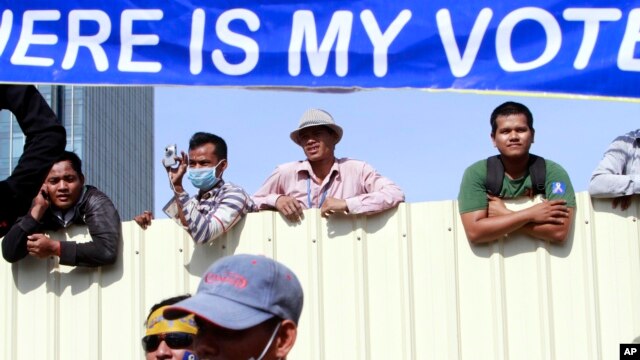Cambodian workers look through a partition of a construction site below a banner which reads "Where is my vote" as supporters of opposition Cambodia National Rescue Party gather in Phnom Penh, file photo.
Khoun Theara, VOA Khmer
14 December 2013
PHNOM PENH — A new alliance of election watchdogs has released a report on the July elections, saying they were marred by problems with identity card distribution, the creation of new polling stations and a “seat division strategy” that favoring the ruling party.
The Electoral Reform Alliance, a group of 20 rights and democracy groups, issued their report on Friday, bolstering claims by the opposition that July’s polls had not been fair and that irregularities cost them the election.
The opposition has refused to join the government or negotiate without a credible investigation into those irregularities.
The 62-page report found that Identity Certificates for Elections, which are temporary documents for voters, were issued to up to 20 percent of eligible voters by election authorities, compared to a demand that was closer to just 1 percent.
That means some 1.8 million temporary IDs were issued, often in areas where up to 97 percent of local officials were members of the ruling Cambodian People’s Party. As a result, the CPP gained more votes in polling stations where the certificates were issued, according to the report.
“So it’s politically biased,” said Pen Reaksa, a program manager at Transparency International Cambodia, a member of the Election Reform Alliance.
The creation of additional polling stations also served the ruling party, the report found. Among 902 new stations, the CPP received 69 percent of votes, compared to the national average of 53 percent, the report says.
The ruling party also employed a strategy of National Assembly seat allocation that helped it slightly in the election, the report found. Seat allocation has remained unchanged since 1993, despite changes in local demographics over the last decade. So where the CPP won only 53 percent of the vote nationwide, it won 68 of 123 seats in the Assembly, or 55 percent of the seats.
The elections were also marred by so-called “ghost voters,” whose names appear on registries without attachment to actual people, as well as the elimination from voter rolls actual eligible voters, the report says.
Kuol Panha, head of the election-monitoring group Comfrel, which is also a member of the reform alliance, said the government should push for election reform.
“If the election process has no integrity, the winning party loses face,” he said. “The loser and the general public are not satisfied, as well, so a fair election should be considered.”
The report also found bias in the policies of the National Election Committee that helped the CPP and
recommends the creation of a new, independent election committee.
Tep Nitha, secretary-general of the NEC, dismissed the findings of the report.
“These are just accusations that they have made many times,” he said. “Some of the findings are not technical or scientific, but rather reflect their political inclinations.”
Widespread reports of election irregularities and fraud in the July polls have put the ruling CPP and the opposition Cambodia National Rescue Party at odds.
The opposition has refused to join the new government or negotiation for power-sharing arrangements without an investigation into the allegations.
Rescue Party President Sam Rainsy told “Hello VOA” on Thursday that the opposition will not negotiate for government positions.
“The people gave those positions to the [Rescue Party],” he said. “The CPP must give them back to the people, in order for the people to give them to the [Rescue Party].”
The Rescue Party, which has refused to join in National Assembly sessions since the elections, is following the “people’s decision,” he said.
“The people tell us not to recognize or accept the elections, so we don’t,” he said. “They tell us not to enter parliamentary sessions, so we don’t.”
The same goes for ongoing demonstrations, he said, which also reflect the will of their supporters.
Sam Rainsy encouraged Cambodian leaders to follow the example of Thai Prime Minister Yingluck Shinawatra, who called for a reelection in the face of mass demonstrations in her country. “They should resign from their positions and reorganize an election, if they won’t agree to recount the ballots [from July],” he said.
Ruling party officials say a reelection is not possible.
Senior CPP lawmaker Cheam Yiep said a reelection would run counter to the law.
Prime Minister Hun Sen has retained his position “because of the will of more than 3.2 million people, who supported the CPP,” he said.
Government spokesman Phay Siphan called Sam Rainsy’s position an attempt at a “constitutional coup.”
As for Thailand, its laws are different, he said. Thai law authorizes the prime minster to dissolve parliament, but in Cambodia, it is the parliament that must dissolve the government, he said.
Sam Rainsy said those claims are only fair with a legitimate government. Right now, he said, Cambodia has a one-party system, “like communism.”


No comments:
Post a Comment